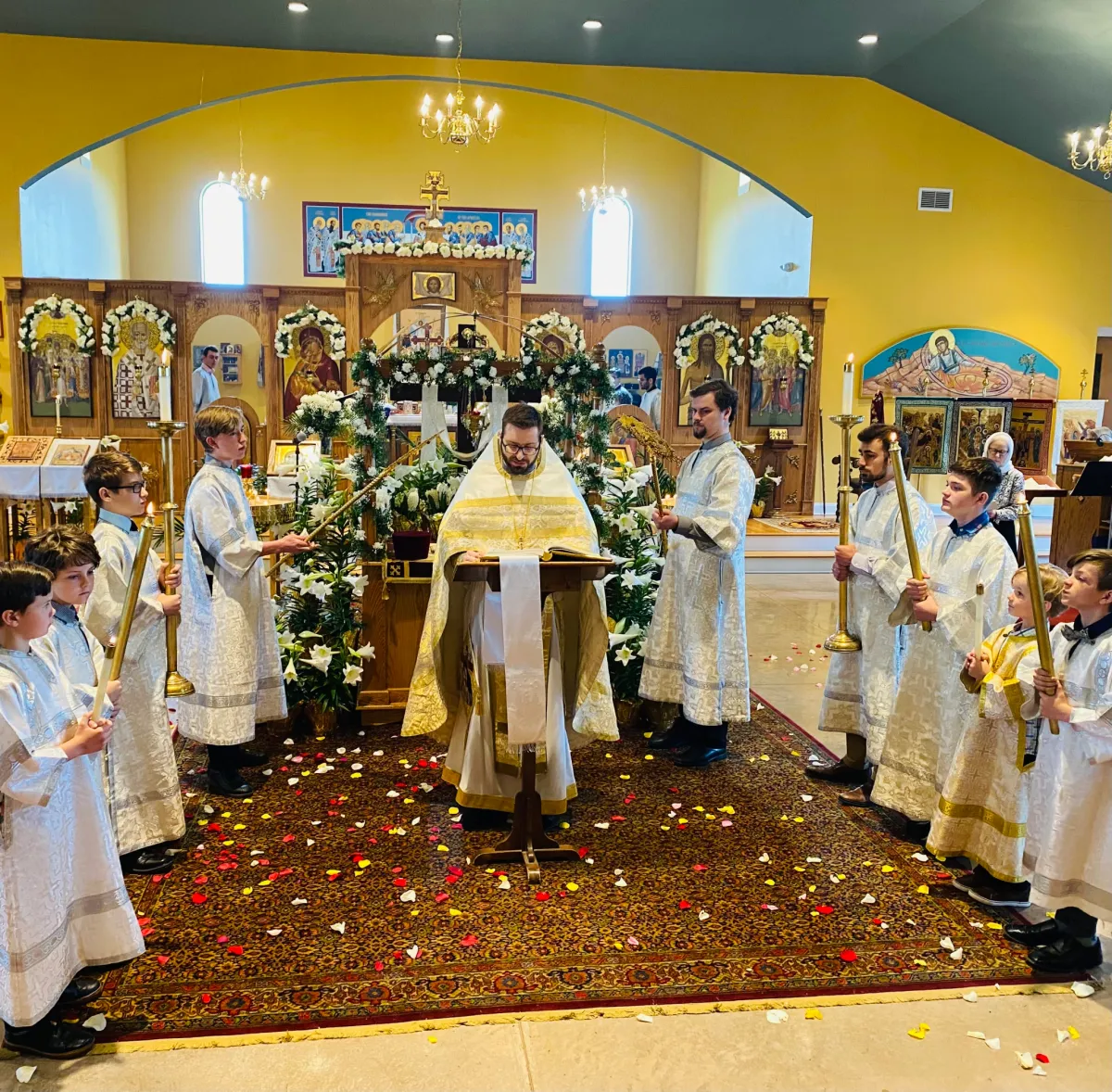In Anticipation of Pascha

This reflection is a fool’s mission, but it seems absurd not to make an attempt at describing this season of Holy Week. Our priest reminds us to keep silent this Holy Saturday as Christ is in the tomb, but these thoughts reach for nothing and contain no conclusions. They are the sound of my silence on this long and blessed afternoon of waiting.
I have no idea how many people are in my parish, but I would take a wild guess that we’ll be over three hundred in a few hours as we gather around ten o’clock this evening for the Paschal celebrations that kept me there with my children until five o’clock in the morning last year. When I walked out of the tent and across the early-morning light of the field beside our church to retrieve my son from his game of ultimate frisbee, he complained that we were always the first ones to leave after every service. Seven hours, and he was not yet ready to go.
My college-bound daughter is baking deluxe brownies for the Pascha basket right now while listening to the Christian singer Lauren Daigle. Her brother in ninth grade is not a fan of Daigle, but he’s out just now and will meet up with us at the church in about five hours. The long list of delectables that my daughter and I have to prepare and pack will certainly not fit into our two baskets. We will be more than well-supplied for wee hours of the morning as we celebrate with our parish. My third child, five years old, has a toy microphone that she is using to play at singing along with Daigle’s soaring lyrics, leaping up onto the back of the couch at dramatic moments to sing at full voice out of our open window into our backyard where the birds are clearly undisturbed in their own ceaseless paeans to Spring.
Sharing the countless details of our seemingly endless trips to church over the past three days would fill books, and this is true, of course, of each day in our life. Just now, however, the countless mundane details and thoughts of these recent days each feel so vivid and radiating with light and significance. They feel worth the effort to share. This in and of itself, of course, is a kind of revelation of a reality that we can only very rarely recognize. Every moment of our lives is a divine encounter that brings us into contact with the timeless life of God. In this fallen form of life that we have now (bound by and steeped in death), we must release each moment and step into the next one because God is only with us in the present moment, and we want to keep pace with God’s living presence (even in our world of death). However, in some way beyond our current grasp, every moment of this life will live on (and come to maturity, in fact) within the Kingdom of God where Christ reigns over ranks of angelic time and holds all of these living times in participation with both the timeless life of the Trinity and with our own stuttering and fallen form of time in this fragmented world.
I’ve gotten off track, however. I was saying that the details of the past few days are lingering in my mind still with an unusual clarity or glory. It is relatively easy for me to believe that all of these myriad moments, each with their layers of sensations and thoughts, are somehow connected to angelic times and even to the timeless life of God. Of course, the specific details of my life in the past few days (the few that I noticed even with my heightened focus) are not at all set apart from the details of all those praying and worshiping with me or free from my regular assembly of sufferings and confusions. In fact, my own moments are enmeshed in and even gifted by the moments of all those surrounding me. My slowly-trained attention allows me to receive each moment as a gift from a host of others and to give to each moment my own simple assistance and gratitude. In the course of the Holy Week services, all of this adds up to a wholeness of life in each moment that is impossible to describe.
For example, during this morning’s service, the Vesperal Divine Liturgy of Holy Saturday, I watched as easily more than half of the adults surrounding me wept briefly in turns. At the same time, almost all of us were invested in caring for a host of little children who were underfoot. My five-year-old daughter and her sidekick were alternately too giggly and unable to handle another moment together. They required dozens of quiet directions and reminders as well as a half dozen brief physical separations where I slipped onto the floor to keep them apart. Both girls are a little less self-disciplined than most others their age (for various reasons both good and bad), and they are a lively pair with their free-flowing play (which turns very easily into wild romps). They are also both given to entirely normal fits of hoarding and deep personal injury at the slightest insults (real or perceived). When—about an hour and half into the service that starts with a slow and somber vespers surrounding Christ’s tomb—all the colors changed from black and silver to white and gold followed by the priest bursting out of the altar doors throwing handfuls of rose petals in five colors high into the air as well as directly over more than one laughing face, when this point came, the two little girls joined the other children in gathering up handfuls of the petals and promptly melted down into hopeless bitterness over how to share their two heaping and fragrant piles of red, white, yellow, pink, and variegated colors. At this point, the mother of my daughter’s friend retrieved her daughter and we kept them apart, allowing them some rest and cuddling until we reached the time for communion when I petitioned to let them go to the chalice together (as they both love to do, often hand-in-hand). As they have so many times now, they hugged—all hurts and angers quickly forgotten—and skipped and gambled their way along in the communion line, stopping to remind each other of the correct way to cross their arms or to ask about jewelry worn by some of the grown women still seated and waiting around them.
All of this is, for obvious reasons, utterly exhausting to the adults and the children. It is also a sublimely good work of prayer and worship that we are doing together. Liturgy, of course, means a collective work or a shared public service. Somehow, all of our tired and broken efforts to remain and to attend give to each of us the joy of God’s own presence. In this season of Holy Week, of course, God’s presence is one that is most clearly capable of suffering with us—of growing weary, staggering, and fainting. We worship a fellow human who prays to be spared from crucifixion and, at the same time, God who can claim that, “when I am lifted up from the earth, I will drag everyone to me” (John 12:32).
These services move us slowly through the washing of Christ’s feet by a prostitute who is upheld as our ideal, the betrayal of Christ by Judas who is disgusted by Christ’s blessing upon the offering of this prostitute, Christ’s own washing of his disciple’s feet, the repentance of Judas (who finds nothing but the coldest of rebuffs when he begs for forgiveness from the religious leaders of his day), the close attention of Christ’s mother as she stays with the crucifixion of her child, the indwelling by Christ of Psalm 22 in his final hours, and his prayer: “Father, forgive them; for they do not know what they are doing.” Obviously, this list should go on and on. Many of our hymns and prayers are in the voice of Mary herself, the mother caring for her child throughout his suffering and death. Often, Christ responds to his mother in our hymns with words of comfort. Also, taking up the voice of the entire church, we sing of “our groom who has been nailed to the cross” and of “the son of the virgin who has been pierced by a spear.” Christ responds to us as well in our hymns, saying that he has poured out every kind of love upon us and agonizing in our continued rejection of him and our brutal crushing of his life. As with so many other high feast days in the Christian year, Mary’s own heart is an exemplar, a central gathering place, a carefully-protected paradise where every one of us can gather and learn and share in the life of God’s unhindered communion with humanity.
The children circle up in an eager crowd to shroud Christ’s body when it is taken down from the cross. We process as a whole congregation with his body outside and around our building before we each walk beneath it and kiss the Gospel book before his body is placed within the flower-decorated tomb at the center of our sanctuary bringing the focus well outside of the altar and into our very midst for the remaining services. Parish members stay through the night to read Psalms beside the tomb by candlelight.
During the car rides to and from church for the three most intense days, my youngest daughter wants to hear the story Sweep by Jonathan Auxier again, and we start the audio book for the third time. It’s a story filled with Jewish folklore and with images of sparrows finding a place to rest and nest within the house of God. It also centers profoundly upon a potter’s field outside a church and notes a man saved at the last moment from committing suicide. (It really is a children’s story, no worries.) I’m astonished by the references to sparrows within the Holy Week services, and by the subtle connections to the story of Judas within Auxier’s beautiful story.
My godmother is a few weeks into intensive chemotherapy treatment for ovarian cancer, and one of her own children recently moved home with their grandchildren who are now among us. This child of my godmother was a student of mine for several years a long while back, as was her son who is newly engaged and who is one of my two godsons (and who was also a student of mine once upon a time). This godmother’s many other godchildren and some of their spouses almost all return to our parish at this time of year from their various new homes, and the mixing of biological family and god-family is tangible—further intertwining me with the entire parish.
Well, I’ve more than spent my little time here, and I’ve not even come to half the impressions and reflections that I hope to try to articulate. In summation, I suppose this is simply to say that Christ’s life with us, even within this world of death, is one of astounding richness and blessing. My wayward heart will cool a little from this flood of gratitude and forget many of these burning desires to somehow share the goodness that I have known. However, as the joy and the blinding light of Pascha overwhelm me once more in the coming night and its lingering dawn, I’m hoping that something here might have somehow reached one person more.





